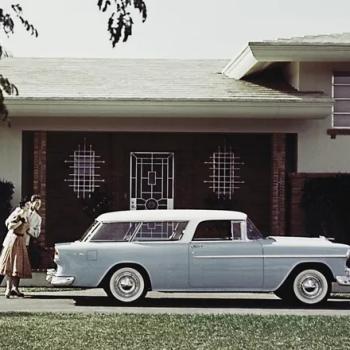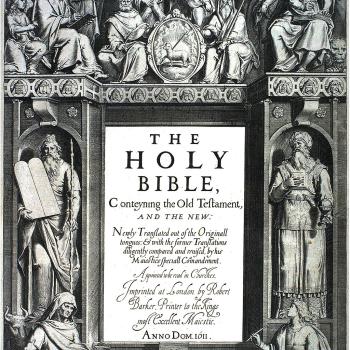On Tuesday, Liberty University president Jerry Falwell Jr. endorsed Donald Trump. A NBC news poll released that same day found that Trump was the preferred choice of a plurality of evangelical voters nationwide.
At first glance, Trump should be doing poorly among evangelical voters. He has no obvious track record of churchgoing, piety, or evangelical beliefs. He has no track record of supporting causes near and dear to many evangelicals, such as the sanctity of life, opposition to same-sex marriage, or religious freedom. Most evangelicals describe themselves as politically conservative, and Trump has no track record of supporting conservative political causes in general.
Moreover, there are many GOP candidates who should appeal to evangelical voters. Some of those, such as Senator Ted Cruz, are appealing to large numbers of evangelicals and garnering endorsements from other evangelical leaders. For a while, Ben Carson captured the imagination of many evangelicals as well. Rick Santorum showed in 2012 that evangelicals will support conservative Catholics, and thus Marco Rubio and Jeb Bush should find it possible to connect with evangelical voters. Rubio in particular speaks rather eloquently about the significance of his faith for both his personal life and political world view. John Kasich speaks very naturally about his faith as well. In short, Donald Trump is a less obvious fit for evangelical voters than very nearly any other serious Republican candidate.
Finally, it’s not just that Trump is not a natural fit for evangelicals. He seems designed to repel them. It is not just that Trump has had extramarital affairs, as Nebraska Senator Ben Sasse noted on Twitter recently. Trump has bragged about being a serial philanderer, about sleeping with many married women. “Beautiful, famous, successful, married,” Trump once bragged, “I’ve had them all, secretly, the world’s biggest names.” It would be easy to come up with around a thousand reasons why evangelicals should not vote Trump. Opposition research would require only the thinnest of effort.Evangelical leaders once criticized Jimmy Carter for giving an interview to Playboy, whose cover Trump once graced. Trump winning the evangelical vote is like Rick Santorum leading among gay Democrats. He is attracting those whom he should naturally repel.
So, what gives?
First, as my co-blogger Thomas Kidd has noted on many occasions, American evangelicals are anything but monolithic. Keep in mind that in many states, evangelicals comprise a majority of GOP primary voters. More than half in Iowa in 2012. Nearly half in Florida. Nearly two-thirds in South Carolina. About a quarter of Americans identify themselves as white evangelical or “born-again” Christians. As one would expect of any large group, evangelicals have diverse views among themselves.
Second, there is no national evangelical leader. Instead, there are thousands of pastors, parachurch organizations, and media figures with influence, but any single leader’s influence only stretches so far. Thus, Jerry Falwell Jr.’s endorsement was coveted, as was Tony Perkins’s, but neither man’s endorsement counts for a great many votes. Trump has benefited from the fact that there was no wave of evangelical endorsements for any single opponent.
Third, many evangelicals do not trust any Washington or “establishment” politicians to actually support pro-life or pro-traditional marriage positions once elected. Evangelical leaders in particular have long memories of past promises from politicians such as Ronald Reagan and George W. Bush, who pledged to support constitutional amendments to protect school prayer or traditional marriage but were not actually committed to such issues. Evangelical leaders in particular have long perceived themselves as unwanted and disdained interlopers in the Republican Party. Sure, there is no reason to think a President Trump would care about such issues either, but that does not mitigate Trump’s outsider, anti-establishment appeal. When the media and the political establish quickly made clear their disdain for Trump last summer, it enhanced his standing among others who also attract that disdain.
Finally, Trump rose to the top of his polls last summer because of his strident opposition to illegal immigration and to high levels of immigration generally. The conventional political wisdom has been that the Republican Party needs to abandon its opposition to illegal immigration in order to win presidential elections. That wisdom is folly in GOP primaries. And whether or not it is wisdom or folly in the general election remains to be seen. And many Republican evangelical voters share Trump’s anti-immigration sentiment.
Evangelicals have supported conservative politicians like Ronald Reagan who learned how to speak their language and express concern for their issues. They’ve voted for Republicans such as George W. Bush, who could convincingly talk about having had born-again spiritual experiences themselves. At times, evangelicals have rebelled against the party establishment, as when they voted for Pat Robertson in 1988 or Rick Santorum in 2012. And in the end, evangelicals have voted for whomever the Republican Party has nominated.
I did not think Donald Trump had a credible path to the Republican nomination a few months ago. I was wrong. He does. Much of the evangelical vote remains up for grabs, but it is now not inconceivable that Trump could win a plurality or even a majority of evangelical primary votes.
About the only thing for certain is that whomever the Republicans nominate, that candidate will win at least seventy percent of the evangelical vote against Hillary Clinton or Bernie Sanders. In other words, should Trump capture the nomination, most evangelicals will vote for him this coming fall, whether with enthusiasm or apprehension. The more Trump solidifies his lead, the more he will solidify his support among evangelicals.














